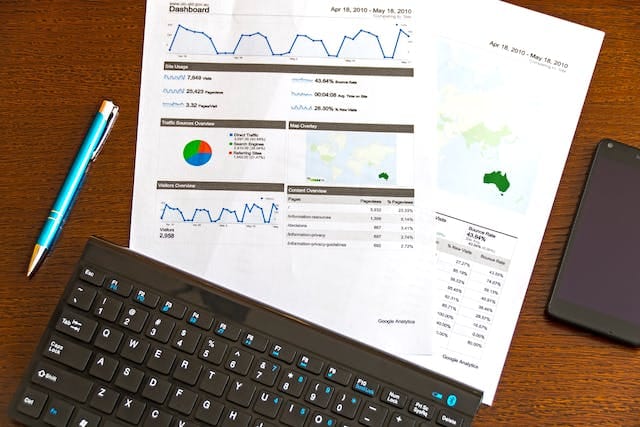Navigating the World of Business Financing: Understanding the Power of a Business Line of Credit
Embark on a journey through the world of business financing with insights into the transformative potential of a business line of credit. Explore this comprehensive guide, unraveling the power and flexibility a business line of credit offers

Introduction to Business Financing Options
Running a successful business requires careful financial planning and access to capital. Whether you are starting a new venture or looking to expand an existing one, understanding the various options available for business financing is crucial. One option that has gained popularity among entrepreneurs is a business line of credit. In this article, we will explore what a business line of credit entails, its advantages, how it works, and whether it is the right financing option for your business.
What is a Business Line of Credit?

A business line of credit is a flexible financing option that provides access to funds up to a predetermined credit limit. Unlike a traditional loan, where you receive a lump sum upfront and repay it in fixed installments, a business line of credit allows you to borrow funds as needed, within the credit limit. It works similarly to a credit card, where you have a maximum credit limit, and you can borrow and repay funds multiple times, as long as you stay within the limit.
Advantages of a Business Line of Credit
There are several advantages to utilizing a business line of credit for your financing needs. Firstly, it provides you with flexibility. You can borrow funds whenever you need them, without having to go through the lengthy application process that traditional loans often require. This flexibility is particularly valuable for businesses with fluctuating cash flow or seasonal demand.
Secondly, a business line of credit offers you control. You have the freedom to use the funds for various purposes, such as purchasing inventory, covering operational expenses, or investing in growth opportunities. Additionally, you only pay interest on the amount you borrow, not the entire credit limit. This means that if you don't need the funds immediately, you won't incur unnecessary interest charges.
Lastly, a business line of credit can help you build a positive credit history. By borrowing responsibly and making timely repayments, you demonstrate your ability to manage credit effectively. This can improve your business's creditworthiness, making it easier to secure financing in the future.
How Does a Business Line of Credit Work?
A business line of credit works by providing your business with a predetermined credit limit, which you can access as needed. Once approved, you can borrow funds up to the credit limit, and you will only be charged interest on the amount borrowed. For example, if your credit limit is $50,000 and you borrow $10,000, you will only pay interest on the $10,000.
Repayments on a business line of credit are typically made in monthly installments. The repayment terms, including interest rates and repayment periods, will vary depending on the lender and the specific terms of the agreement. It is important to carefully review and understand the terms before signing any agreement.
Qualifying for a Business Line of Credit
Qualifying for a business line of credit will depend on several factors, including the financial health of your business, your credit history, and your ability to demonstrate the ability to repay the funds. Lenders will typically assess your business's revenue, profitability, and overall financial stability to determine your creditworthiness.
In addition, lenders will also consider your personal credit history. If you have a strong personal credit score, it can increase your chances of qualifying for a business line of credit. Conversely, a poor credit history can make it more challenging to secure financing.
To improve your chances of qualifying for a business line of credit, it is essential to maintain accurate financial records, demonstrate consistent revenue and profitability, and manage your personal credit responsibly.
How to Apply for a Business Line of Credit

Applying for a business line of credit typically involves the following steps:
1. Research and compare lenders: Start by researching different lenders and comparing their terms and interest rates. Look for lenders that specialize in providing business lines of credit and have favorable terms for your specific needs.
2. Gather required documents: Lenders will require various documents to assess your eligibility. These may include financial statements, tax returns, bank statements, and business licenses. Gather these documents in advance to streamline the application process.
3. Prepare a business plan: A well-prepared business plan can help demonstrate to lenders that you have a clear vision for your business and a strategy for utilizing the funds. Include information about your industry, target market, competition, and financial projections.
4. Complete the application: Once you have selected a lender, complete the application form accurately and provide all the requested information. Be prepared to answer questions about your business, its financials, and your personal credit history.
5. Wait for approval: After submitting your application, the lender will review your information and make a decision. The approval process can vary in length, so be patient and prepared to provide additional documentation if requested.
Tips for Using a Business Line of Credit Effectively
While a business line of credit can be a valuable financing tool, it is important to use it responsibly to maximize its benefits. Here are some tips for using a business line of credit effectively:
1. Plan your borrowing: Before accessing funds from your business line of credit, have a clear plan for how you will use the funds. Avoid borrowing for unnecessary expenses or non-business-related purposes.
2. Monitor your credit utilization: It is recommended to keep your credit utilization ratio below 30%. This means that if your credit limit is $50,000, try to keep your outstanding balance below $15,000. Keeping your credit utilization low can positively impact your credit score and increase your chances of securing future financing.
3. Make timely repayments: Ensure that you make your monthly repayments on time to maintain a positive credit history. Late or missed payments can negatively impact your credit score and make it more difficult to secure financing in the future.
4. Review and adjust your credit limit: As your business's financial needs evolve, it may be necessary to review and adjust your credit limit. If your business requires a higher credit limit, contact your lender and discuss the possibility of increasing it.
Alternatives to a Business Line of Credit
While a business line of credit can be a beneficial financing option, it may not be suitable for every business. Depending on your specific needs and circumstances, there are alternative financing options to consider:
1. Small Business Administration (SBA) loans: SBA loans are government-backed loans designed to support small businesses. They offer longer repayment terms and competitive interest rates, making them an attractive option for businesses that meet the eligibility criteria.
2. Equipment financing: If your business requires specific equipment or machinery, equipment financing can be a viable option. This type of financing allows you to borrow funds specifically for purchasing or leasing equipment, with the equipment serving as collateral.
3. Invoice factoring: If your business experiences cash flow challenges due to slow-paying customers, invoice factoring can provide a solution. With invoice factoring, a finance company purchases your accounts receivable at a discount, providing you with immediate cash flow.
Business Line of Credit vs. Other Financing Options

When evaluating financing options for your business, it is essential to consider the specific advantages and disadvantages of each option. While a business line of credit offers flexibility and control, other financing options may be better suited for different circumstances.
For example, if you need a substantial amount of capital for a long-term project, a term loan might be more appropriate. Alternatively, if you are a start-up business with limited credit history, exploring funding options specifically designed for start-ups could be beneficial.
Conclusion: Is a Business Line of Credit Right for Your Business?
Navigating the world of business financing can be complex, but understanding the power of a business line of credit can help you make informed decisions for your business's financial needs. Consider your business's specific requirements, financial stability, and future goals when evaluating whether a business line of credit is the right option for you.
Remember to compare different lenders, review the terms and conditions carefully, and use the funds responsibly. By doing so, you can leverage the advantages of a business line of credit and position your business for success.
CTA: Contact us today to explore how a business line of credit can benefit your business and discuss the financing options available to you.




